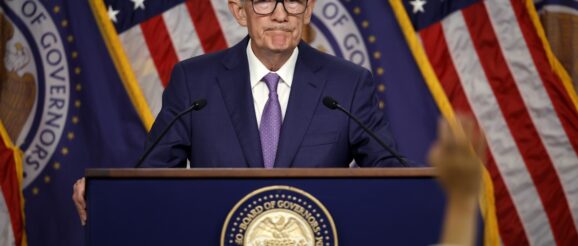A weird partisan pattern of trust in the Fed Planet Money

Recently, when President Trump threatened to fire Federal Reserve Chairman Jerome Powell, financial markets flipped out. Then Trump insisted he wasn’t going to fire Powell, but he still took time to criticize the Fed’s interest-rate policy under Powell’s leadership. Markets chilled out, a bit.
This confrontation between the president and America’s central bank inspired Planet Money to collaborate with its sister podcast The Indicator to make an episode that serves as a primer on the Federal Reserve. It explains why economists and investors tend to believe that an independent central bank — free of presidential meddling — is crucial to a stable, low-inflation economy. And it goes over a bit of the history of Trump’s antagonistic relationship with the Fed under Powell, a man Trump appointed to head the U.S. central bank in the first place.
The old pendulum swing
In the study, economists Carola Binder (at University of Texas at Austin), Cody Couture (at Hamilton College), and Abhiprerna Smit (at William & Mary) look at partisan views of the Federal Reserve. They first analyze survey data from Gallup Poll and the Michigan Survey of Consumers between 2001 and 2023.
For instance, if a respondent was a Democrat, they were more likely to express trust in the Federal Reserve when President Obama was in office. If a respondent was a Republican, they were more likely to express trust in the Fed when President Bush was in office (independents, meanwhile, tended to always be the most distrustful of the Fed, whether a Democrat or Republican was in office). This is a factor, the economists find, that is “much larger than any demographic differences.”
It’s kinda weird because the White House doesn’t call the shots at the Fed. The central bank has long been independent of the political branches in its day-to-day decision-making.
Importantly, this phenomenon of Americans expressing trust in the Fed when their political party controlled the White House was true during President Trump’s first term as well (even though, starting around 2019, President Trump began bashing Jerome Powell and the Fed’s interest-rate policies). Republicans tended to have higher trust in the Fed than Democrats, during his first term.
The economists wanted to see if anything has changed in President Trump’s second term. Would this pattern repeat itself? Republicans definitely distrusted the Fed more than Democrats during President’s Biden’s tenure. Would they, like they had in the past, begin trusting the Fed more than Democrats now that a Republican controlled the White House?
This time the pendulum didn’t swing
To answer this question and more, the economists conducted an online survey in early 2025 of more than 3,000 Americans. They did this survey in two waves, shortly before and then shortly after Trump’s inauguration.
The economists’ survey suggests that, actually, this time is different. Republicans expressed lower trust in the Fed than Democrats did (and independents are in the middle, between Democrats and Republicans, in how much they trust the Fed).
The economists’ survey did offer respondents space to write why they believed what they believed. And — despite the potential inflationary impact of Trump’s tariffs and immigration crackdown — Republican respondents often gave answers that suggested they believed Trump would single-handedly bring down inflation through, for example, business deregulation or greater energy production.
Democrats, meanwhile, expressed the highest faith in the Fed. Yet they were more likely to express fears about inflation. Many of them tended to cite tariffs as a reason why they believed inflation would get worse. Many others just said basically, because, you know, Trump.
